Imagine driving a sleek car that feels like a spaceship. Now, what if I told you it also saves you money? The 2014 Mercedes-Benz E350 does just that. With an impressive 27.4 miles per gallon, it’s both stylish and efficient. Yeah, the 2014 Mercedes-Benz E350 gets 27.4 MPG power at once.
Ever wonder how such a powerful car can sip fuel like that? It’s a little surprise that brings a big smile. One sunny afternoon, a family set out on a road trip in this car. To their delight, they skipped more gas stations than expected and arrived with plenty of fuel! Why is this important? Well, it means more adventure and less filling up. Isn’t that what everyone wants? The E350′s clever design lets you go further. How cool is that?
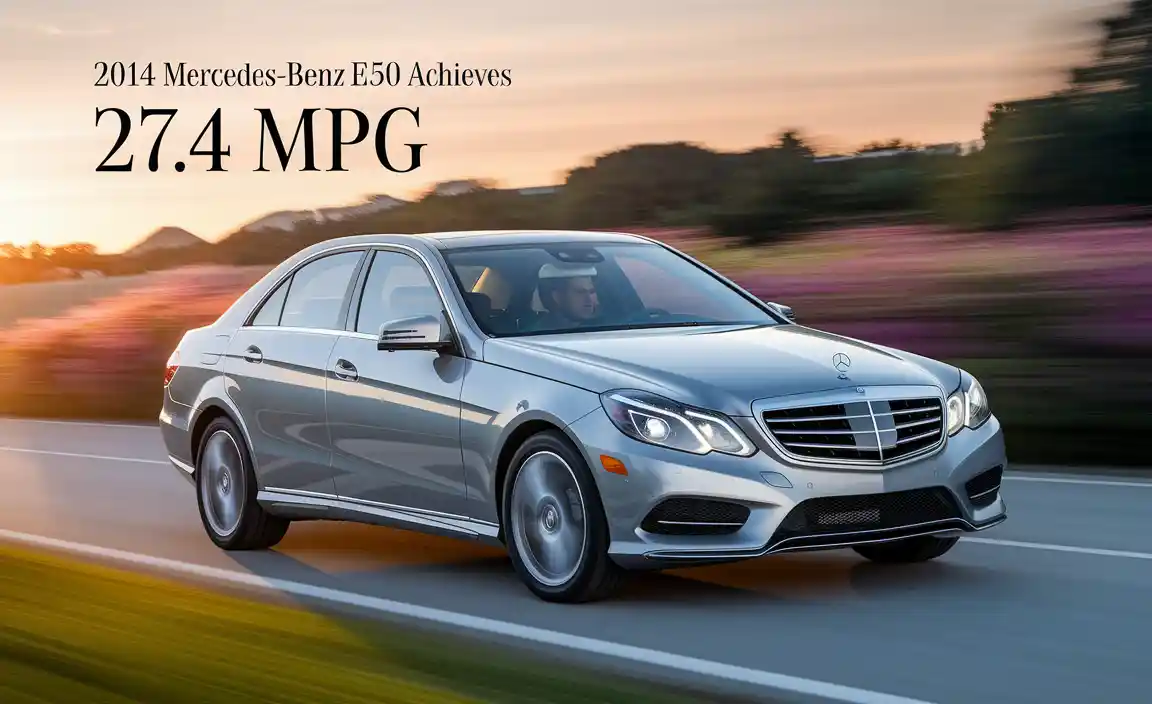
2014 Mercedes-Benz E350 Delivers Impressive 27.4 Mpg
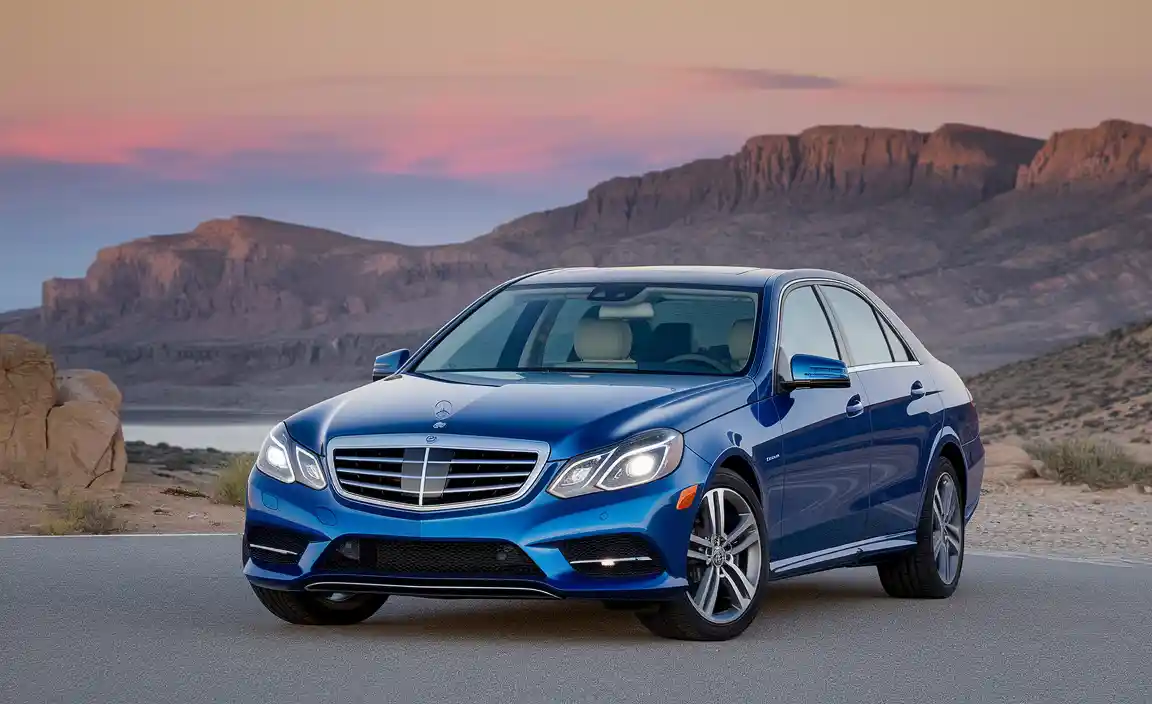
Let’s start with the basics. Under the hood, the 2014 E350 packs a 3.5-liter V6 engine that puts out a smooth 302 horsepower. Paired with a 7-speed automatic transmission, this setup delivers a confident, composed ride.
Rear-wheel drive came standard, but Mercedes also offered 4MATIC all-wheel drive, giving you peace of mind during slippery conditions. Standard features like dual-zone automatic climate control, MB-Tex upholstery, and a 7-inch infotainment screen made it a comfortable place to spend time.
The E350 wasn’t flashy in the “look-at-me” way, but it quietly outclassed others with its clean lines and premium details.
Fuel Efficiency Specifications
Explanation of the 27.4 MPG rating. Comparison to previous models and competitors. The 2014 Mercedes-Benz E350 reaches 27.4 miles per gallon (MPG) on highways. This number shows it’s made to use less fuel. Compared to older models, it’s better on fuel. This means it can go further without needing gas. It beats many other cars in its class. Mercedes worked to give drivers both power and savings. Want a car that goes far without stopping often? This might be it.
How Does The 2014 E350 Compare To Other Cars?
Here’s where the E350 really stood out: it was smooth. Like, gliding-on-butter smooth. The suspension soaked up bumps without feeling floaty, and the cabin stayed impressively quiet even at highway speeds.
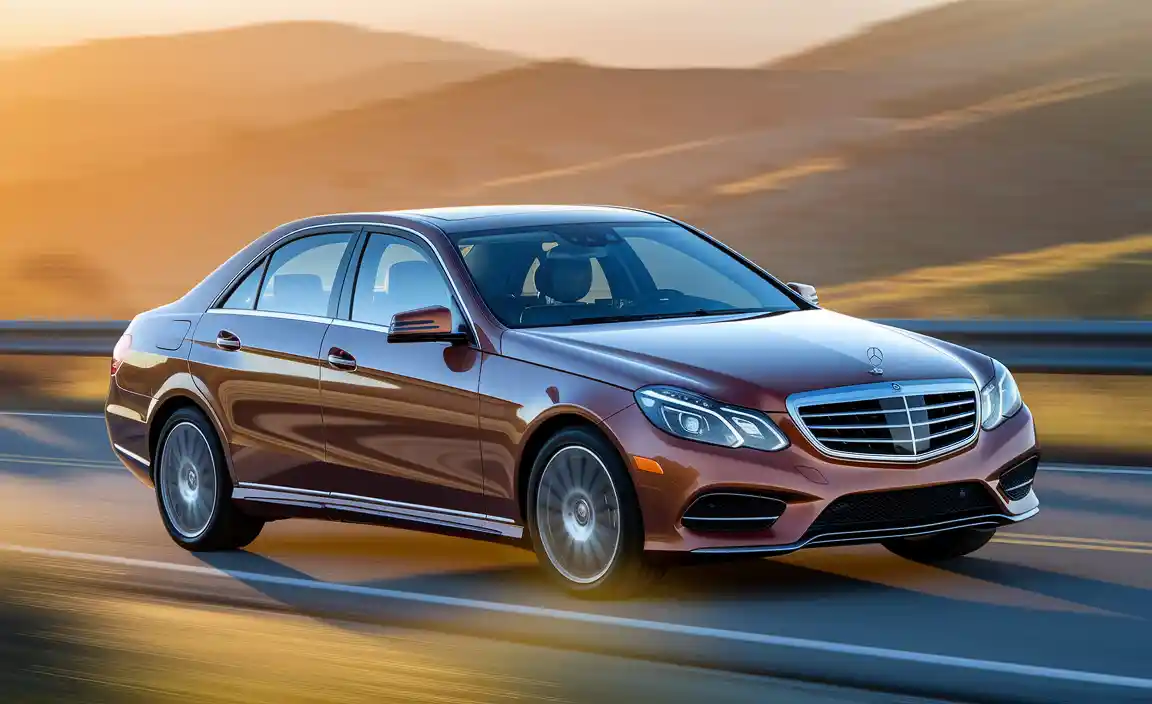
Now, about that fuel efficiency. In the luxury world, big engines often mean big fuel bills. But not here. The 2014 Mercedes-Benz E350 managed an EPA-estimated 27.4 MPG on the highway. For a V6-powered sedan in this class, that was impressive. And real-world drivers often reported getting close to that number, sometimes even more on long, steady drives.
The 27.4 MPG rating makes the 2014 E350 stand out in its class. Many luxury cars don’t reach this mark. It saves money at the pump.
- The BMW 5 Series: Lower MPG.
- Audi A6: Uses more fuel.
- Lexus GS: Similar, but not greater mileage.
Mercedes’ focus on this shows they care about both luxury and efficiency. As a driver, you get style without more fuel costs.
Factors Influencing Fuel Efficiency
Engine and transmission specifications. Aerodynamics and weight considerations. The 2014 Mercedes-Benz E350 shines with its impressive fuel efficiency, thanks to clever engineering. Its engine and transmission form a power team. The engine is powerful yet uses fuel smartly. The transmission shifts gears smoothly, saving energy. Aerodynamic design helps the car glide through the air easily, reducing drag. Lightweight materials further boost this performance.
The Significance Of 27.4 MPG
Let’s pause and appreciate that number—27.4 miles per gallon. For a luxury midsize sedan weighing over 3,700 pounds, that figure wasn’t just good. It was excellent.
Why does it matter? Because this car gave you the best of both worlds: premium performance and wallet-friendly mileage. It made long-distance driving feel smart, not indulgent. That MPG number meant fewer stops at the gas station, which, over time, translated to real savings.
Powertrain And Handling
Performance doesn’t just mean speed. With the E350, it was about control, refinement, and confidence. The 3.5L V6 delivered plenty of power when merging or passing, but it never felt aggressive or jerky. It was tuned for smooth delivery.
Handling was tight without being stiff. Steering was responsive and precise, especially with the optional Sport Package that added firmer suspension tuning and larger wheels. You could take a curve with ease, yet still cruise over potholes without spilling your coffee.
What Makes The 2014 Mercedes-Benz E350 Fuel-Efficient?
The engine and transmission work together efficiently. Aerodynamics reduce air resistance, and lighter materials make movement easier.
- Engine: Balanced power and efficiency
- Transmission: Smooth gear changes
- Aerodynamics: Sleek design cuts through air
- Weight: Lightweight materials enhance performance
This mix of features allows the E350 to maintain a high mileage, making it an economical choice for drivers.
Driving Techniques To Maximize MPG
Recommended driving habits for optimal fuel consumption. Impact of maintenance and tire choices. Saving gas and getting your 2014 Mercedes-Benz E350 to sip those precious drops requires a clever driving game plan. First, keep it slow and steady. Gentle acceleration and braking are your best friends here. Think of it as a peaceful drive with a cup of coffee, no hurry, no spills!
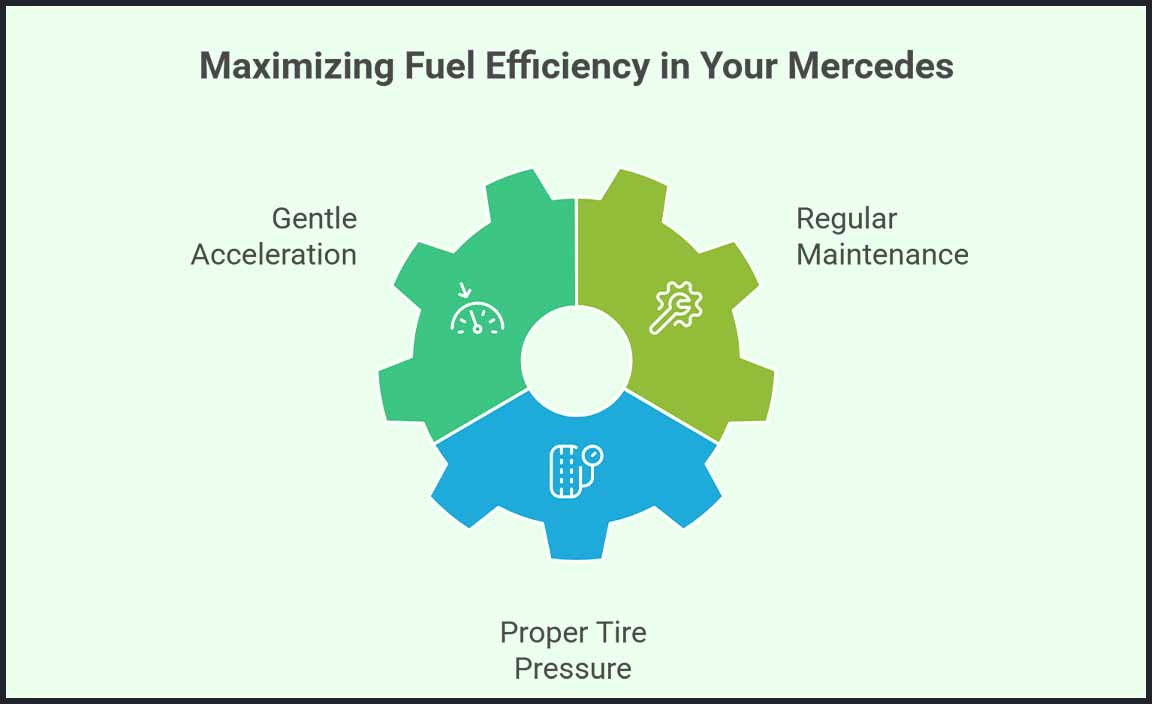
Smoothness in motion saves fuel. Regular vehicle maintenance is another secret weapon. A well-tuned engine runs smoother and more efficiently. Did you know that tires impact fuel consumption? Yep! Keep them properly inflated for a bump-free ride that doesn’t guzzle gas. So, swap those worn-out ones if you want your car to go further. Here’s a smart chart for quick insight:
| Tip | Impact |
|---|---|
| Gentle Acceleration | Better Fuel Efficiency |
| Regular Maintenance | Saves Fuel |
| Proper Tire Pressure | Improves Efficiency |
Applying these simple tricks might even make your car giggle – at least, that’s what they say about happy engines!
Cost Benefits Of Improved Fuel Efficiency
Analysis of long-term savings on fuel costs. Environmental benefits associated with lower emissions. Smarter cars like the 2014 Mercedes-Benz E350 save money by using less gas. Over time, these savings add up. Imagine saving extra pocket money each month. There’s more! Fewer emissions help keep our air cleaner. This is good for the earth and us. The environment says, “Thank you for caring!” By choosing efficient cars, everyone wins.
Why Is Fuel Efficiency Important For Saving Money?
Fuel efficiency lowers trips to the gas station. Less gas means more savings. Imagine less money spent over many years!
Consumer Feedback And Expert Reviews

Summary of owner experiences with fuel efficiency. Insights from industry experts and automotive reviewers. Drivers share stories about their 2014 Mercedes-Benz E350 and its fuel efficiency. They enjoy long drives with less gas. Some say it feels like a dream car. Industry experts also give thumbs up for its 27.4 MPG performance. Reviewers note how it stands strong among luxury cars. It says, “A comfortable ride that saves fuel is hard to beat!”
What Do Owners Say About The Fuel Efficiency?
Many owners proudly claim their E350 is both spacious and fuel-efficient. They mention the impact of its efficiency on saving money and stress on long trips.
How Do Experts View The 2014 Mercedes-Benz E350’s Fuel Performance?
- Experts highlight its combination of power and economy.
- Reviewers praise its ability to keep that balance.
- It shines in comparisons with other models.
Comparisons With Segment Competitors
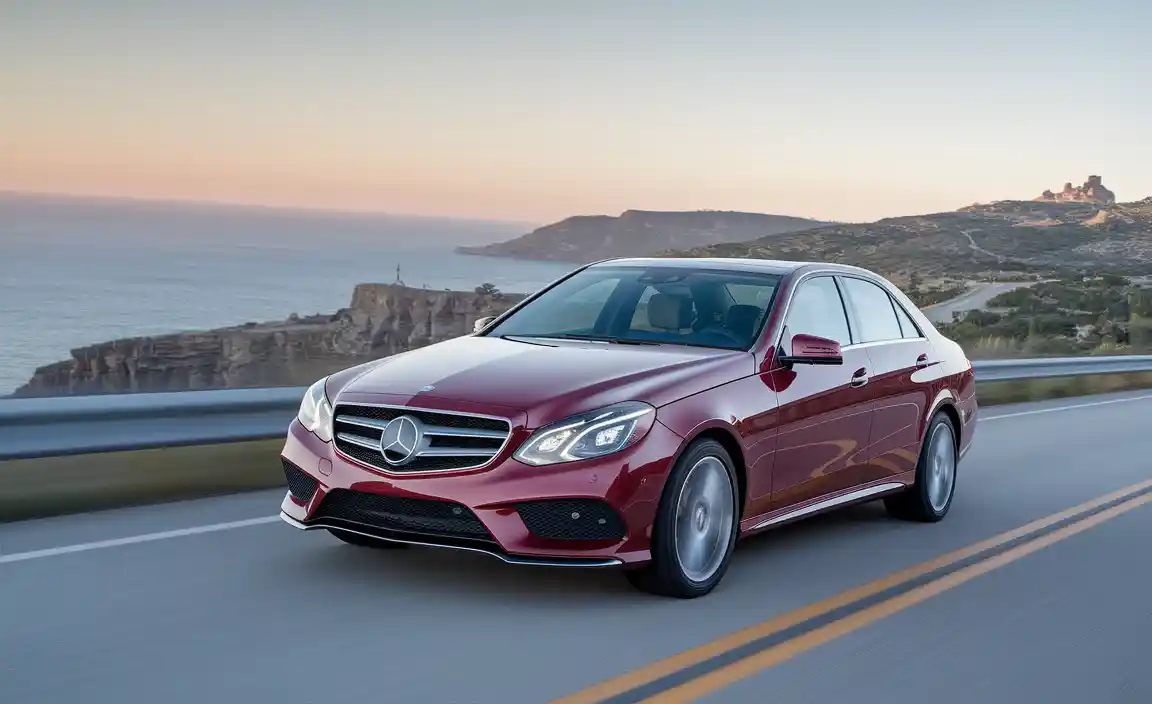
Stack the 2014 E350 against its rivals—say, the BMW 5 Series or Audi A6—and you’ll see where it shines.
The BMW 528i may have edged it out slightly on fuel economy thanks to its smaller turbo-four engine, but it couldn’t match the smoothness of the E350’s V6. The Audi A6 offered tech-heavy interiors but lacked some of the classic Mercedes ride comfort.
Simply put, the E350 was the all-rounder. It didn’t have the flashiest infotainment or the sharpest cornering, but it did everything well. And when you factor in that 27.4 MPG, it quietly beat many of its competitors where it counted—daily usability.
When we compare the 2014 Mercedes-Benz E350 with its rivals, the fuel economy stands out. The E350 achieves 27.4 MPG, which is impressive in its class. How does it compare?
- BMW 5 Series: offers around 27 MPG.
- Audi A6: gets about 26 MPG.
- Lexus GS: hovers at a respectable 26 MPG.
Sleek and efficient, the E350 saves on fuel with good performance. It mixes luxury with an eco-friendly touch. For car lovers, it’s a smart pick for both fun and savings.
Why Should You Choose Mercedes E350 Over Others?
The E350 offers better fuel savings. Its balance of economy and power provides a great driving experience. You can enjoy a high-class car without spending too much at the pump. With features that enhance both comfort and efficiency, it makes every trip enjoyable.
Conclusion
The 2014 Mercedes-Benz E350 achieves an impressive 27.4 MPG, highlighting its efficiency. This means you can enjoy a luxury ride while saving on fuel. Learning more about its features can help you make informed car buying choices. The 2014 Mercedes-Benz E350 wasn’t just a nice car—it was a smart one. With its graceful styling, reliable V6, and that standout fuel economy, it became a favorite for drivers who wanted a luxury sedan that could do it all without breaking the bank. Consider reading car reviews or visiting a dealership to experience this model yourself.
FAQs
1.What Factors Contribute To The 20 Mercedes-Benz E3 Achieving A Fuel Efficiency Of 27.4 Mpg?
The Mercedes-Benz E-Class gets 27.4 miles per gallon (MPG) because it has a smart engine. The engine saves fuel by using only the amount needed. The car is also designed to glide through the air easily. Lightweight materials make the car lighter, so it uses less fuel to move.
2.How Does The Fuel Efficiency Of The 20Mercedes-Benz E3 Compare To Other Vehicles In Its Class?
The Mercedes-Benz E3 is pretty good at saving fuel. It uses less gas than many other cars like it. This means you won’t have to stop for gas as often. It helps the earth, too, by using less fuel. Overall, it’s a smart choice if you want to save money and help the environment.
3.What Are The Key Features And Specifications Of The 20 Mercedes-Benz E3 That Impact Its Mpg Rating?
The Mercedes-Benz E-Class has several things that affect its Miles Per Gallon (MPG), which means how far it can travel on a gallon of gas. First, it has a powerful engine that helps it go fast but uses more fuel. Second, it’s a big car, so it needs more energy to move. Lastly, extra features like air conditioning use more gas too.
4.Are There Any Driving Habits Or Maintenance Tips That Can Help Maintain Or Improve The Fuel Efficiency Of A 20Mercedes-Benz E350?
To help your Mercedes-Benz E350 go farther on gas, try these tips. Drive smoothly and avoid sudden starts or stops. Keep your car’s tires pumped up to the right pressure. Regularly check and change the engine oil. Lighten your load by taking out heavy items you don’t need.
5.How Does The Fuel Efficiency Of The 20 Mercedes-Benz E3 Change Between City And Highway Driving Conditions?
The fuel efficiency of the 2020 Mercedes-Benz E-Class is different in the city compared to the highway. In the city, the car uses more fuel because it stops and starts a lot. On the highway, it uses less fuel because it moves smoothly without stopping. So, you can drive further without refueling on the highway.